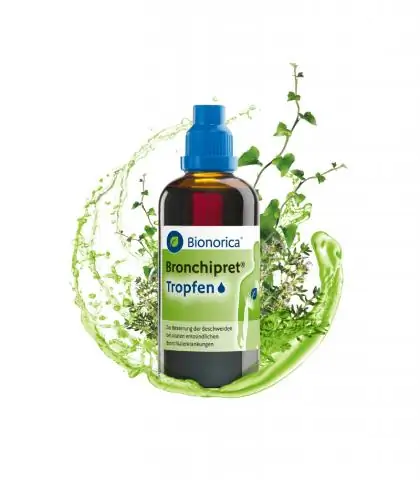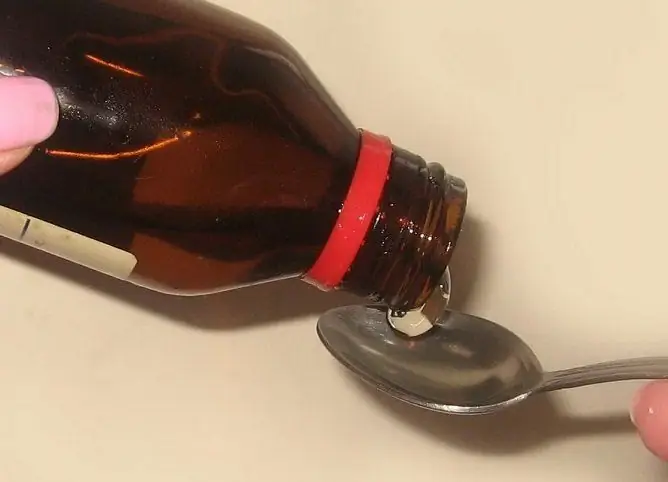- Author Rachel Wainwright wainwright@abchealthonline.com.
- Public 2023-12-15 07:39.
- Last modified 2025-11-02 20:14.
Terasil-D
Terasil-D: instructions for use and reviews
- 1. Release form and composition
- 2. Pharmacological properties
- 3. Indications for use
- 4. Contraindications
- 5. Method of application and dosage
- 6. Side effects
- 7. Overdose
- 8. Special instructions
- 9. Application during pregnancy and lactation
- 10. Use in childhood
- 11. Drug interactions
- 12. Analogs
- 13. Terms and conditions of storage
- 14. Terms of dispensing from pharmacies
- 15. Reviews
- 16. Price in pharmacies
Latin name: Therasil-D
ATX code: R05X
Active ingredients: dextromethorphan + phenylephrine + chlorphenamine (Dextromethorphanum + Phenylephrinum + Chlorphenaminum)
Manufacturer: Plethico Pharmaceuticals Ltd. (Plethico Pharmaceuticals Ltd.) (India)
Description and photo update: 2020-05-02

Terasil-D is a combined antitussive drug (antitussive opioid agent + sympathomimetic agent + H 1 -histamine receptor blocker).
Release form and composition
Dosage form - syrup: yellow with a sweet taste of fruit (in a cardboard box 1 glass bottle of dark yellow color containing 60 or 100 ml of syrup, and instructions for use of Terasil-D).
Active ingredients in 5 ml syrup:
- dextromethorphan hydrobromide monohydrate - 10 mg;
- phenylephrine hydrochloride - 5 mg;
- chlorphenamine maleate - 2 mg.
Auxiliary components: citric acid monohydrate, levomenthol, propylene glycol, sodium saccharinate dihydrate, bronopol, sodium propyl parahydroxybenzoate, sodium methyl parahydroxybenzoate, sucrose, water, fruit flavor, quinoline yellow dye.
Pharmacological properties
Pharmacodynamics
Terasil-D is a combined drug, the action of which is due to the active substances included in its composition, namely:
- dextromethorphan: belongs to the number of antitussives, is close to the strength of the therapeutic effect of codeine. It has some sedative effect, suppresses dry cough of various nature, increases the threshold of sensitivity of the cough center of the medulla oblongata. It has no hypnotic, narcotic and analgesic effect, the respiratory center does not depress. After 10-30 minutes after administration, the onset of its action is noted, which in children lasts for a period from 6 to 9 hours, in adults - from 5 to 6 hours;
- phenylephrine: is an alpha-adrenergic agonist with a vasoconstrictor effect. Facilitates breathing through the nose and helps to eliminate nasal congestion;
- Chlorphenamine: a blocker of H 1 -histamine receptors with antiallergic properties.
Indications for use
Terasil-D syrup is used for the symptomatic treatment of dry irritating cough in acute respiratory diseases, colds and other acute / chronic respiratory pathologies.
Contraindications
Absolute:
- hyperthyroidism;
- bronchial asthma;
- epilepsy;
- combination therapy with monoamine oxidase (MAO) inhibitors;
- age up to 6 years;
- pregnancy;
- lactation period;
- established hypersensitivity to the components of the drug.
Relative (taking Terasil-D requires special care and careful medical supervision):
- recent myocardial infarction;
- cardiac ischemia;
- hyperplasia of the prostate;
- retention of urine;
- angle-closure glaucoma.
Terasil-D, instructions for use: method and dosage
Terasil-D syrup is intended for oral administration. A single dose should be taken with water.
Recommended dosage regimen:
- children over 6 years old: 2.5-3.5 ml of syrup 3-4 times a day;
- adults: 5-7.5 ml of syrup 3-4 times a day.
Side effects
- central nervous system: headache, increased excitability, drowsiness, impaired coordination of movements, dizziness, tinnitus, euphoria, anxiety, apathy, tremor, epileptiform seizures;
- cardiovascular system: tachycardia, decrease / increase in blood pressure;
- digestive system: pain in the epigastric region, increased appetite, anorexia, dry mouth, constipation, diarrhea, nausea, vomiting, increased salivation;
- urinary system: urinary retention, difficulty urinating, papillary necrosis (nephrotoxicity);
- sense organs: increased intraocular pressure, blurred vision, paresis of accommodation, mydriasis;
- hematopoietic organs: thrombocytopenia, anemia, including aplastic and hemolytic;
- allergic reactions: itching / rash, bronchial obstruction, angioedema.
Overdose
Possible symptoms of an overdose of Terasil-D active substances:
- dextromethorphan: dyspeptic disorders, dizziness, decreased blood pressure, agitation, impaired consciousness, tachycardia, ataxia, muscle hypertonicity, respiratory depression;
- phenylephrine: increased blood pressure, agitation, heart rhythm disturbances;
- chlorphenamine: urinary retention, dry mouth, sleep disturbances, dizziness, agitation.
Therapy: gastric lavage, artificial ventilation of the lungs, symptomatic treatment. Dextromethorphan has a specific antidote - naloxone.
special instructions
Since dextromethorphan enhances the effect of ethanol, it is important to refrain from using the latter during the period of therapy.
A few days before the skin tests, it is necessary to stop taking Terasil-D, since the chlorphenamine included in its composition in some cases suppresses positive allergic skin tests.
Influence on the ability to drive vehicles and complex mechanisms
During the period of therapy with Terasil-D, you should drive with caution, as well as perform other work associated with increased attention and speed of psychomotor reactions.
Application during pregnancy and lactation
The appointment of Terasila-D during pregnancy / lactation is contraindicated.
Pediatric use
Terasil-D syrup is not used in children under 6 years of age.
Drug interactions
Dextromethorphan
Recommended combinations to take into account:
- narcotic antitussives and other drugs that depress the central nervous system (antidepressants, neuroleptics, tranquilizers, barbiturates): their effect is enhanced;
- selegiline, procarbazine, furazolidone, MAO inhibitors: therapy can lead to increased blood pressure, the development of dizziness, agitation, tremor, spasms, nausea, hyperpyrexia, collapse, adrenergic crisis, lethargy, intracranial bleeding and coma;
- quinidine, fluoxetine, amiodarone: by inhibiting the cytochrome P 450 system, they can increase the content of the substance in the blood;
- tobacco smoke: against the background of inhibition of the cough reflex, sometimes increases the secretion of glands.
Phenylephrine
Possible interactions with other drugs / substances:
- guanethidine: enhances the alpha-adrenostimulating activity of the drug;
- diuretics and antihypertensive drugs, including guanethidine, guanadrel, mecamylamine, methyldopa: their hypotensive effect decreases;
- adrenostimulants, methylphenidate, tricyclic antidepressants, ergot alkaloids, oxytocin, selegiline, procarbazine, furazolidone and other MAO inhibitors: cause an increase in the arrhythmogenicity and pressor effect of the drug;
- reserpine: blood pressure may increase (due to depletion of catecholamine stores, sensitivity to adrenomimetics in adrenergic endings increases);
- doxapram, oxytocin, methylergometrine, ergotamine, ergometrine: increase the severity of the vasoconstrictor effect of phenylephrine;
- inhalation anesthetics, including methoxyflurane, isoflurane, halothane, enflurane, chloroform: sharply increase the sensitivity of the myocardium to sympathomimetics, and therefore the use of the combination is accompanied by an increased risk of severe ventricular and atrial arrhythmias;
- nitrates: phenylephrine reduces their antianginal effect.
Chlorphenamine
Combined treatment with furazolidone or MAO inhibitors is accompanied by an increased risk of hyperpyrexia, agitation, hypertensive crisis.
Analogs
The analogues of Terasil-D are Bronholitin, Bronchoton, Bronchocin, Padeviks, Alex Plus, Glycodin, etc.
Terms and conditions of storage
Store in a place protected from light and moisture at temperatures up to 25 ° C. Keep out of the reach of children.
The shelf life is 3 years.
Terms of dispensing from pharmacies
Dispensed by prescription.
Reviews about Terasil-D
There are few reviews about Terasil-D, indicating its effectiveness.
In one of the patients, taking the syrup caused the development of undesirable effects, which, however, could be associated with the presence of individual intolerance to the components of the drug.
Price for Terasil-D in pharmacies
The price of Terasil-D is unknown, since the drug is not available in pharmacies. The approximate cost of an analogue of the drug, Bronholitin (1 bottle with 125 ml of syrup in the package), is from 102 to 159 rubles.

Maria Kulkes Medical journalist About the author
Education: First Moscow State Medical University named after I. M. Sechenov, specialty "General Medicine".
Information about the drug is generalized, provided for informational purposes only and does not replace the official instructions. Self-medication is hazardous to health!






